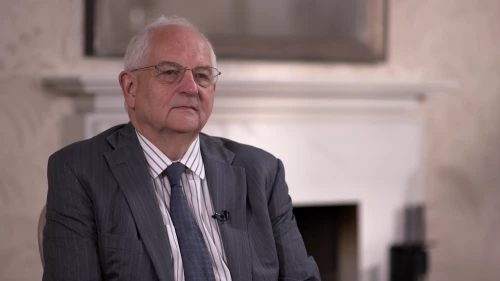As we rapidly approach 2020, Europe and the Eurozone stand at a crossroads. Martin Wolf, chief economics commentator at the Financial Times, sat down with Alexander Roos, a senior partner and managing director at BCG, to talk about the direction of Europe’s economy and ways in which Europe’s political role might change in the coming years. Their discussion touched on such topics as European integration, next steps for integration within Europe’s financial sector, the ways that Europe can best interact with other global economic and political leaders, and risks that threaten the global economy.
Described as “the Anglosphere’s most influential finance journalist,” Wolf applies his unique perspective and experience to understanding and providing unparalleled clarity on European and global economies.
About Martin Wolf
About Martin Wolf
Chief Economics Commentator, Financial Times
Martin Wolf is chief economics commentator at the Financial Times, London. In 2000, he was named a Commander of the British Empire for services to financial journalism.
In 1989 and 1997, Wolf was joint winner of the Wincott Foundation senior prize for excellence in financial journalism. He also won the 1994 RTZ David Watt Memorial Prize, Accenture Decade of Excellence recognition at the Business Journalist of the Year Awards of 2003, the 2009 Ludwig Erhard Prize for economic commentary, and Commentariat of the Year 2009 at the Comment Awards, sponsored by Editorial Intelligence. In addition, he was joint winner of the 2009 award for columns in “giant newspapers” at the 15th annual Best in Business Journalism competition of The Society for Advancing Business Editing and Writing.
His most recent book, first published in 2014, is The Shifts and the Shocks: What We’ve Learned—and Have Still to Learn—from the Financial Crisis.
Wolf was educated at University College School, an independent day school for boys in Hampstead in northwest London, and in 1967 entered Corpus Christi College at Oxford University for his undergraduate studies. He initially studied classics before switching to philosophy, politics, and economics. As a graduate student, Wolf moved on to Nuffield College, also at Oxford, where he earned a master of philosophy degree in economics in 1971.
Thank you very much for meeting with us to talk about Europe and 2020. Let’s start by taking a look at the current situation in Europe and in the Eurozone. What’s your assessment?
Let me separate economics from politics, though they are obviously profoundly interlinked. If you look at the economy, it’s a pretty good picture by the standards of much of the last decade. Unfortunately, the political situation looks much less good.
I would say that it’s sort of a race between the economics, which should make people calmer and more confident in time, and the politics, which partly is a lagging consequence of all those years of disaster and is in very severe disarray.
In this context, what do you think about the journey of European integration? Will we see more integration?
It seems to me that the creation of the euro, along with the massive decisions that were taken in the 1990s following the immensely significant event of German unification—was a high point of will and determination by the leaders of that time.
These two great integration exercises—the currency union and the enlargement—have proved more difficult, at the very least, and possibly far more difficult than anyone imagined. We’re still struggling very obviously with the consequences of both.
Do you think that integration in the financial sector—banking union and so forth—was a necessary step toward stabilizing and sustaining the situation in Europe and the Eurozone?
Though the really important steps were made during the crisis, the creation of the pan-Eurozone regulatory machinery, in conjunction with the European Central Bank, was a great step forward. The regulation of banks has massively improved. But it remains the case—and you can see this clearly in Italy—that the symbiosis between the banks and government debt remains very close.
There are now moves to do what I think is essential: to create genuinely pan-Eurozone banks as the Americans have done. They now have national banks. That should happen.
In light of these intra-European challenges, where do you see the role of Europe in the world relative to China, other parts of Asia, North America, and, specifically, the US?
The EU is a trading superpower. The question is not whether it is one but how it wants to use this power. And it faces now, I think, a profound dilemma, which has two fronts. One, how does it deal with the US bilaterally? Two, how does it deal with the US not just bilaterally but also in its global context. A particularly big problem for the Europeans is how to get involved in the relationship between the US and China. Europe has an enormous economic interest in China. Much of what the US wants from China in intellectual property and so forth, Europeans would like to be involved in, and, in principle, they’re on the side of the Americans.
At the same time, Europeans rightly—very profoundly—reject the bilateralism, the managed-trade aspects of the American approach to China. I think that the Europeans cannot, at the moment, make up their minds what to do.
What do you see as the biggest single risk for the global economy these days?
I think the biggest single risk, and I hope I’m wrong, is not narrowly economic. I think there are real economic issues out there. Many. But the really big threats, I think, are geopolitical. We are moving into a period during which superpower rivalry is becoming a major factor in the world.
We don’t know what we can’t see, but history tells us that really bad geopolitics can overwhelm everything. Getting through this period of great power transition with a stable order, with basic cooperation, is essential for our economy. And at the moment, I’m not as optimistic as I would like to be.
Thank you very much for talking with us.
It’s a great pleasure.






